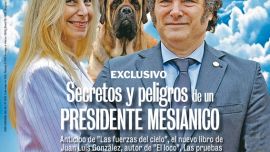Meat producers announced Tuesday they would stop selling beef and veal for one week in response to a month-long government suspension on exports due to rising prices.
The Liaison Commission for Agricultural Entities (La Comisión de Enlace de Entidades Agropecuarias), which represents agricultural producers and businesses, declared a "cessation of all categories of cattle trade" from midnight on Thursday to May 28.
On Monday night, the government announced a suspension on foreign meat sales to "get the sector in order, restrict speculative practices and avoid tax evasion in foreign trade."
Earlier on Tuesday, President Alberto Fernández insisted that Argentina could not accept the recent rise in meat prices in a country already reeling from three years of recession and the adverse economic impact of the coronavirus pandemic.
"The meat issue has got out of hand. The price is rising every month without justification. We need to get it under control," the Peronist leader told Radio 10.
The government took the decision due to the strong impact that price rises have on Argentina's inflation, already one of the highest in the world and which increased by 17.6 percent during the first four months of the year, according to the INDEC national statistics institute.
The cost of living has soared 46.3 percent in the last 12 months but beef prices in April were 65.3 percent higher than the same month in 2020, the Argentine Institute of Beef Promotion (IPCVA) said.
Argentines ate 38 kilogrammes (84 pounds) of beef and veal per head in 2019 – the most among Organisation for Economic Cooperation and Development countries (OECD), and about 12 kilogrammes per head more than the United States.
Argentina is also the fourth largest exporter of beef in the world, the revenues from which are vital to the country's economy.
In 2020, Argentina exported US$3.37 billion worth of beef and cow leather – a 16.5 percent drop compared with 2019 – primarily to China, Germany and Israel, according to INDEC.
But poverty affects 42 percent of Argentines, and Fernández is trying to reduce the cost of living ahead of this year's PASO primaries and midterm elections by implementing price controls through agreements with business sectors.
Meat processing plants offer certain cuts of meat at reduced prices but Fernández said it's "a crumb of 8,000 tons of meat when here we eat 200,000 tons a month."
'Absolutely harmful'
Miguel Schiaritti, president of the Argentine chamber of industry and commerce for meat and its derivatives – which puts the country's per capita beef consumption at 49.2 kilogrammes – blasted the government's move.
"The measure is absolutely harmful for Argentina. It's not possible to make a sector that employs more than 100,000 people responsible for inflation," Schiaritti told AFP.
He said a previous restriction on meat exports imposed initially for six months in 2006 during the presidency of Néstor Kirchner lasted 10 years.
"We know this generated the loss of 12.5 million heads [of cattle], 19,000 jobs were lost and 150 factories closed, of which only 70 reopened," he added.
Fernández rejected those claims on Tuesday.
"From 2015 to 2019 the sector was fully opened [under the Mauricio Macri administration], but the number of cattle did not increase. The only thing that increased is the price of meat. The opening does not favour the markets, it benefits the most powerful," said the Peronist leader
The backlash from meat producers was swift.
"We are going to join together immediately to totally reject this disastrous measure," said Daniel Peregrina, president of industry body the Argentina Rural Society.
"The damage caused by the measure will decrease the supply of meat, making prices rise as has happened in the past."
On Twitter, the Argentina Rural Confederation also rejected the government's plan.
"The closure of meat exports is an error," the organization posted. "A step back for the development and growth of ranching."
Dardo Chiesa, coordinator of the National Meat Board, warned today that the suspension of meat exports for 30 days would "kill livestock" and cause the loss of "500,000 jobs."
"The government does not realise what the meat industry means to Argentina," the leader complained.
It's not the first time the agriculture industry has gone on strike in protest at government measures.
A four-month strike was organised in 2008 when then-president Cristina Fernández Kirchner, currently the vice president, announced a plan to raise taxes on some exports. The tension eased when the initiative was eventually rejected by Congress.
– TIMES/AFP

























Comments